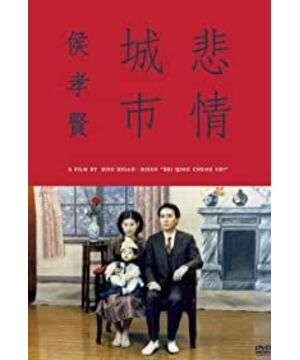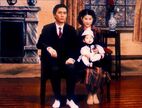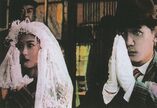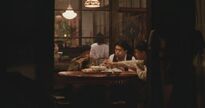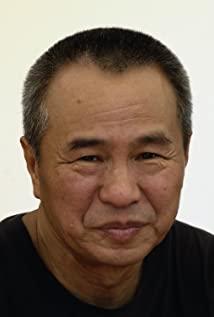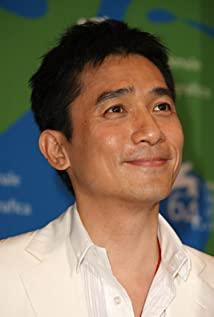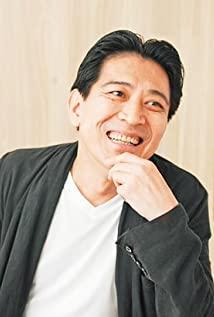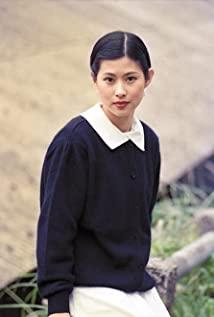"City of Sadness", without exception, selects the rise and fall of the family as an era's In short, the historical span is not very large. From the recovery of Taiwan in 1945 to the KMT fleeing to Taiwan in 1949, in just four years, with a series of political changes in Taiwan, a family has gone through the process of rising and falling.
The fourth son of the Lin family, Lin Wenxiong, the eldest son, basically supports the family's affairs. The second son went to Nanyang in his early years and his whereabouts are unknown. The third son, Wenliang, was beaten violently because he was suspected of a traitor incident. The shadow of a family's decadence is real and solemn, so you can't look at its existence. After watching the decline of the family, I still can't escape the haze of the times. What kind of helplessness and sadness is that? A mistake made by the times destroys the beautiful image.
Hou Hsiao-hsien's shots are neat, not sloppy, not delicate, and more close-up of family details. This is also the perspective that Otsu pays attention to, giving families and individuals more humanistic care. It's just that the sadness rendered by Ozu is hidden behind the background of the times and hidden. From the clip of the old couple visiting their children in "Tokyo Story", it can be seen that there is no sadness in the long shot. But after reading it, there is always a kind of lingering sadness, sad for the loneliness of the old couple at night, sad for the tenderness, filial piety and loyalty of the little daughter-in-law, which more or less reflects the helplessness made in the face of real life. reflection. In the film, Hou Hsiao-hsien also frequently uses long shots to let you see the whole event, no, it should be the development of the whole set of actions. Long shots will more often put the audience on a three-dimensional side view, the sad aesthetics produced by distance, Maybe it started from this. An impressive set of long shots is the last scene, a scene of the Lin family having a meal. There are three generations of the family. The eldest son, Wenxiong, has been shot in a vendetta. The crazy third son Wenliang, and the next generation of heirs, the camera is projected through the door of the hall, and then you see such a family, going back and forth in the hall, flashing back in front of the camera, you will give birth to a fragile life Powerless chant? The young, energetic group of people left, the shadow of sadness and decadence shrouded in the family, and the sullen heart could not be dissipated for a long time.
I really like the wide and beautiful narrative narration in the film, talk about it, the language is plain but the artistic conception is beautiful... and her love with the fourth son of the Lin family, Wenqing, is fresh and tender. The film Zhongwen Qing is played by Tony Leung, a peaceful and quiet intellectual. Of course, he has been aphasia since he was eight years old and can't hear others speak. He even complained a little bit about Hou Hsiao-hsien's arrangement. Facing such a kind and fragile life, it makes people feel pity, and it's hard not to feel sad. Wen Qing and Kuan Mei's brother Kuan Rong were very good friends. They often got together with some intellectuals to criticize the current situation and denounce the government's ugly behavior. Of course, this also planted the seeds for the tragic fate of the two later. At this time, Wen Qing and Kuan Mei would sit on the side and listen to the music on the gramophone quietly. They wrote cards to each other, it was their way of communicating, the sun was falling, she said it was called "Monrelle", a famous German song, an old legend, and he happily told her that he had Called a future actor by the teacher. Kuan Mei looked at him quietly, unable to hide the sadness in her eyes... Kuan Mei told Wenliang the splendid life like cherry blossoms, which originated from the story of a woman who jumped down from a waterfall. The woman is neither world-weary nor despairing, just facing the brilliant youth It was about to pass and I felt helpless, so I chose to leave the branches with the wind at the most beautiful time like cherry blossoms and gently fall. So this act inspired a generation of people at that time, that era was the era of the Meiji Restoration... Hou Hsiao-hsien's humanistic concern for individual destiny is to capture the sad and powerless psychological trajectory through this helpless struggle in life to reflect the era. denounced, which is no less than a slap in the face.
Later, Wen Qing and Kuan Mei got married, and they had a child named Qian. The family was so quiet and peaceful. Wen Qing sat and wrote a letter to Xiao Xue (Wen Xiong's daughter), while Qian crawled around, babbling from time to time. . This is one of the few warm imagery that only looks at the heart. But one day, Wen Qing received news of Kuan Mei's brother Kuan Rong's death. Wen Qing couldn't help covering his face after reading the news, while Kuan Mei was feeding the child. Holding Kuan Mei's hand tightly, Kuan Mei leaned on Wen Qing's shoulder, and looked back at the young Qian, her tears were no longer in control... This is another set of cold long shots, Hou Hsiao-hsien is through this The long stretch of time and space allows enough time and space for sadness to ferment and diffuse in the space, making the audience deeply aftertaste.
On the third day of his arrest, Wen Qing took a photo with Kuan Mei and her young son. His movements were quiet. At the moment when the camera was frozen, it seemed that time had stopped, and the picture was extremely beautiful. They wanted to escape, their luggage was already packed, but they finally chose the result they didn't want to choose. This is the powerless and tragic struggle of individual destiny in the face of a powerful and arrogant political theme...
This picture is like an oil painting The solemn feeling, I like the tune of
"City
of Sadness". The original soundtrack of "City of Sadness" presented by SENS for this drama is a perfect combination with the plot. It's a feeling of desolation...
Every time I read it, I always end up feeling sad, well, it's not Hou Hsiao-hsien being hypocritical, it's me being hypocritical...
View more about A City of Sadness reviews


